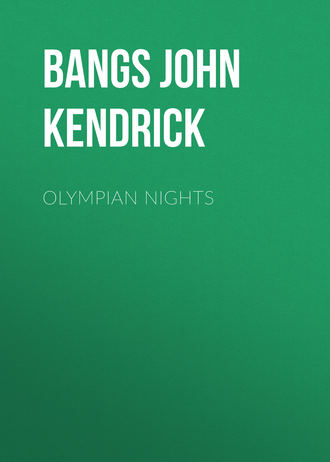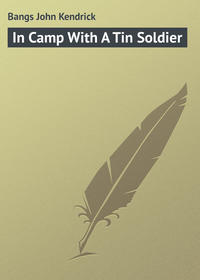 полная версия
полная версияOlympian Nights
"Nothing," said he. "The real physician can never be paid. He either restores your health or he does not. If he restores your health, he saves your life, and he is entitled to what your life is worth. If he does not restore your health—he has failed, and is entitled to nothing. All you have will never pay your doctor for what he does for you. Therefore, go in peace."
I stood abashed in the presence of this wise man, and, as I went forth from his office, I realized the truth of what he had said. In our own world we place a value upon the service of the man who carries us over the hard and the dark places. Yet who can really repay him for all that he does for us when by his skill alone we are rescued from peril?
I re-entered my sedan-chair and set the blackies off again, with something potent in my mind—how much I truly owed to the good man who has taken at times the health of my children, of my wife, of myself, in his hands and has seen us safely through to port. I have not yet been able to estimate it, but if ever he reads these lines, he will know that I pay him in gratitude that which the world with all its wealth cannot give.
"Now for the Zoo, boys," I cried. "Æsculapius has fixed me up."
And we scampered on.
VIII
At the Zoo
We had not travelled far from the office of Æsculapius when my little carriers turned from the broad and beautiful corridor into a narrow passage, through which they proceeded with some difficulty until we reached the other side of this strangely constructed home of the gods. As we emerged into the light of day, the view that presented itself was indescribably beautiful. I have looked from our own hills at home upon many a scene of grandeur. From the mountain peaks of New Hampshire, with the sun streaming down upon me, I have looked upon the valleys beneath through rifts in clouds that had not ventured so high, and were drenching the glorious green below with refreshing rains, and have stood awed in the presence of one of the simplest moods of nature. But the sight that greeted my eyes as I passed along that exterior road of Olympus, under the genial auspices of those wonderful gods, appealed to something in my soul which had never before been awakened, and which I shall never be able adequately to describe. The mere act of seeing seemed to be uplifting, and, from the moment I looked downward upon the beloved earth, I ceased to wonder that gods were godlike—indeed, my real wonder was that they were not more so. It seemed difficult to believe that there was anything earthly about earth. The world was idealized even to myself, who had never held it to be a bad sort of place. There were rich pastures, green to the most soul-satisfying degree, upon which cattle fed and lived their lives of content; here and there were the great cities of earth seen through a haze that softened all their roughness; nothing sordid appeared; only the fair side of life was visible.
And I began to see how it came about that these Olympian gods had lost control over man. If the world, with all its joys and all its miseries, presents to the controlling power merely its joyous side, what sympathy can one look for in one's deity? There was Paris and Notre Dame in the sunlight. But the Morgue at the back of Notre Dame—in the shadow of its sunlit towers—that was not visible to the eye of the casual god who drove his blackamoors along that entrancing roadway. There was London and the inspiring pile of Westminster showing up its majestic top, lit by the wondrous light of the sun—but still undiscovered of the gods there rolled on its farther side the Thames, dark as the Styx, a very grave of ambition, yet the last solace of many a despairing soul. London Bridge may tell the gods of much that may not be seen from that glorious driveway along the exterior of Olympus.
I found myself growing maudlin, and I pulled myself together.
"Magnificent view, Sammy," said I.
"Yassir," he replied, trotting along faithfully. "Dass what dey all says. I 'ain't nebber seen it. 'Ain't got time to look at it."
"Well, stop a moment and look," said I. "Isn't it magnificent?"
The blackies stopped and looked.
"Putty good," said Sammy, "but I doan' care fo' views," he added. "Dey makes me dizzy."
I gave Sammy up from that moment. He was well carved, a work of art, in fact, but he was essentially modern, and I was living in the antique.
"Hustle along to the Zoo," I cried, with some impatience, and I was truly "hustled."
"Here we is," said Sammy, settling down on his haunches at the end of a five-mile trot. "Dis is it."
We had stopped before a gate not entirely unlike those the Japanese erect before popular places of amusement they frequent.
I descended from the chair and was greeted by an attendant who demanded to know what I wished to see.
"The animals," said I.
He laughed. "Well," he said, "I'll show you what I've got, but truly most of them have gone off on vacation."
"Is the Trojan Horse here?" I demanded.
"No," said he. "He's in the repair shop. One of his girders is loose, and the hinges on his door rusted and broke last week. His interior needs painting, and his left hind-leg has been wobbly for a long time. It was really dangerous to keep him longer without repairs."
I was much disappointed. In visiting the Olympian Zoo I was largely impelled by a desire to see the Trojan Horse and compare him with the Coney Island Elephant, which, with the summer hotels of New Jersey and the Statue of Liberty, at that time dominated the minor natural glories of the American coast in the eyes of passengers on in-coming steamships. I think I should even have ventured a ride in his capacious interior despite what Sammy had said of his friskiness and the peril of his action to persons susceptible to sea-sickness.
"Too bad," said I, swallowing my disappointment as best I could. "Still, you have other attractions. How about the Promethean vulture? Is he still living?"
"Unfortunately, no," said the attendant. "He was taken out last year and killed. Got too proud to live. He put in a complaint about his food. Said Prometheus was a very interesting man, but as a diet he was monotonous and demanded a more diversified menu. Said he'd like to try Apollo and a Muse or two, for a little while, and preferred Cupids on toast for Sunday-night tea."
"What a vulturian vulture!" said I.
"Wasn't he?" laughed the attendant. "We replied by wringing his neck, and served him up in a chicken salad to a party of tourists from Hades."
This struck me as reasonable, and I said so.
"Well, whatever you happen to have on hand will satisfy me," I added. "Just let me see what animals you have and I'll be content."
"Very well," replied the attendant. "Step this way."
He took me along a charming pathway bordered with many a beautiful tree and adorned with numerous flowers of wondrous fragrance.
"This path is not without interest," he said; "all the trees and shrubs have a history. That laurel over there, for instance, used to be a Daphne. She and Jupiter had a row and he planted her over there. Makes a very pretty tree, eh?"
"Extremely," said I. "Have you many similar ventures?"
"Oh yes. Our botanical gardens are full of them," he replied. "Those trees to the right are Baucis and Philemon. That lotos plant on the left used to be Dryope, and when Adonis isn't busy valeting at the hotel, he comes down here and blooms as an anemone, into which, as you are probably aware, he was changed by Venus. That pink thing by the fountain is Hyacinthus, and over there by the pond is where Narcissus blooms. He's a barber in his off hours."
I had already learned that, so expressed no surprise.
"That's a stunning sunflower you have," I ventured, pointing to a perfect specimen thereof directly ahead of us.
"Yes," said the attendant. "That's Clytie. She's only potted. We don't set her out permanently, because the royal family like to have her on the table at state dinners. And she, poor girl, rather enjoys it. Apollo is generally to be found at these dinners either as a guest or playing a zither or a banjo behind a screen. Wherever he is, the sunflower turns and it affords considerable amusement among Jupiter's guests to watch it. Jupiter has christened Clytie the Sherlock Holmes of Olympus, because wherever Apollo is she spots him. Sometimes when he isn't present, he has to be very careful in his statements about where he has been, for long habit has made Clytie unerring in her instinct."
This seemed to me to be a rather good revenge on Apollo for his very ungodlike treatment of Clytie, and if half the attendant told me that day at the Zoo is true, this excessively fickle Olympian is probably sorry by this time that he treated her originally with such uncalled for disdain.
"Come over here and see the bear-pit," said the guide. I obeyed with alacrity, and, leaning over the rail, had the pleasure of seeing the most beautiful bruin my eyes had ever rested upon. She was as glossy as a new silk hat; her eyes were as soft and timid as those of a frightened deer, and, when she moved, she was the perfection of grace.
"Good-morning, Callisto," said my guide.
"Same to you, my dear Cephalus," the bear returned, in a sweet feminine voice that entranced me.
"How are things with you to-day?" asked Cephalus, with a kindly smile.
"Oh, I can't growl," laughed Callisto—it was evident that the unfortunate woman was not taking her misfortune too seriously. "Only I wish you'd tell people who come here that while I undoubtedly am a bear, I have not yet lost my womanly taste, and I don't want to be fed all the time on buns. If anybody asks you what you think I'd like, tell them that an occasional omelette soufflée, or an oyster pâté, or a platter of petits fours would please me greatly."
"I shall do it, Callisto," said the keeper, as he started to move away. "Meanwhile, here's a stick of chewing-gum for you." Callisto received it with a manifestation of delight which moved me greatly, and I bethought myself of the magic properties of my coat, and plunging my hand into its capacious pockets, I found there an oyster pâté that made my mouth water, and an omelette soufflée that looked as if it had been made by a Parisian milliner, it was so dainty.
"If madam will permit me," said I, with a bow to Callisto.
"Thank you kindly," the bear replied, in that same thrillingly sweet voice, and dancing with joy. "You are a dear, good man, and if you ever have an enemy, let me know and I'll hug him to death."
As we again turned to go, Cephalus laughed. "Queer case that!" he said. "You'd have thought Juno would let up on that poor woman, but she doesn't for a little bit."
"Well—a jealous woman, my dear Cephalus—"
"True," said he. "That's all true enough, but, great Heavens, man, Juno ought to be used to it by this time with a husband like Jupiter. She's overstocked this Zoo a dozen times already with her jealous freaks, and Jupiter hasn't reformed once. What good does it do?"
"Doesn't she ever let 'em off?" I asked. "Doesn't Callisto ever have a Sunday out, for instance?"
"Yes, but always as a bear, and the poor creature doesn't dare take her chance with the other wild beasts—the real ones. She's just as afraid of bears as she ever was, and if she sees a plain, every-day cow coming towards her, she runs shrieking back to her pit again."
"Poor Callisto," said I. "And Actæon? How about him?"
"He's here—but he's a holy terror," replied Cephalus, shaking his head. "He gets loose once in a while, and then everybody has to look out for himself, and frankly," Cephalus added, his voice sinking to a whisper, "I don't blame him. Diana treated him horribly."
"I always thought so," said I. "He really wasn't to blame."
"Certainly not," observed Cephalus. "If people will go in swimming out-of-doors, it's their own fault if chance wayfarers stumble upon them. To turn a man into a stag and then set his own dogs on him for a thing he couldn't help strikes me as rank injustice."
"Wonder to me that Jupiter doesn't interfere in this business," said I. "He could help Callisto out without much trouble."
"The point about that is that he's afraid," Cephalus explained. "Juno has threatened to sue him for divorce if he does, and he doesn't dare brave the scandal."
We had by this time reached a long, low building that looked like a stable, and, as we entered, Cephalus observed:
"This is our fire-proof building where we keep our inflammable beasts. That big, sleeping creature that looks like a mastodon lizard is the dragon that your friend St. George, of London, got the best of, and sent here with his compliments. I'll give the beast a prod and let you see how he works."
Cephalus was as good as his word, and for a moment I wished he wasn't. Such a din as that which followed the dragon's awakening I never heard before, and every time the horrible beast opened his jaws it was as if a fire-works factory had exploded.
"Very dangerous creature that," said Cephalus. "But he is splendid for fêtes. Shows off beautifully in the dark. I'll prod him again and just you note the prismatic coloring of his flames. Get up there, Fido," he added, poking the dragon with his stick a second time. "Wake up, and give the gentleman an illumination."
The scene of the moment before was repeated, only with greater intensity, and even in the sunlight I could see that the various hues his fiery breathings took on were gorgeous beyond description. A bonfire built of red, pink, green, and yellow lights, backed up by driftwood in a fearful state of combustion, about describes it.
"Superb," said I, nearly overcome by the grandeur of the scene.
"Well, just imagine it on a dark night!" cried Cephalus, enthusiastically. "Fido is very popular as a living firework, but he's a costly luxury."
I laughed. "Costly?" said I. "I don't see why. Fireworks as grand as that must cost a deal more than he does."
"You don't know," said Cephalus, pressing his lips together. "Why, that dragon eats ten tons of cannel coal a day, and it takes the combined efforts of six stokers, under the supervision of an expert engineer, to keep his appetite within bounds. You never saw such an eater, and as for drinking—well, he's awful. He drinks sixteen gallons of kerosene at luncheon."
I eyed Cephalus narrowly, but beyond a wink at the dragon, I saw no reason to believe that he was deceiving me.
"Then he sets fire to things, and altogether he's an expensive beast Aren't you, Fido?"
"Yep," barked the dragon.
"Now, over there," continued the guide, patting the dragon on the head, whereat the fearful beast wagged his tail and breathed a thousand pounds of steam from his nostrils to express his pleasure. "Over there are the fire-breathing bulls—all the animals here are fire-breathing. The bulls give us a lot of trouble. You can't feed 'em on coal, because their teeth are not strong enough to chew it; and you can't feed 'em on hay, because they'd set fire to it the minute they breathed on it; and you can't put 'em out to pasture because they'd wither up a sixty-acre lot in ten minutes. It's an actual fact that we have to send for Jason three times a day to come here and feed them. He's the only person about who can do it, and how he does it no one knows. He pats them on the neck, and they stop breathing fire. That's all we know."
"But they must eat something. What does Jason give them?" I demanded.
"We've had to invent a food for them," said Cephalus. "Dr. Æsculapius did it. It's a solution of hay, clover, grass, and paraffine mixed with asbestos."
"Paraffine?" I cried. "Why, that's extremely inflammable."
"So are the bulls," was Cephalus's rejoinder. "They counteract each other." I gazed at the animals with admiration. They were undoubtedly magnificent beasts, and they truly breathed fire. Their nostrils suggested the flames that are emitted from the huge naphtha jets that are used to light modern circuses in country towns, and as for their mouths, any one who can imagine a bull with a pair of gas-logs illuminating his reflective smile, instead of teeth, may gain a comprehensive idea of the picture that confronted me.
I had hardly finished looking at these, when Cephalus, impatient to be through with me, as guides often are with tourists, observed:
"There is the phœnix."
I turned instantly. I have always wished to see the phœnix. A bird having apparently the attractive physique of a broiler deliberately sitting on a bonfire had appealed strongly to my interest as well as to my appetite.
"Dear me!" said I. "He's not handsome, is he?"
He was not; resembling an ordinary buzzard with wings outstretched sitting upon that kind of emberesque fire that induces a man in a library to think mournfully about the past, and convinces him—alas!—that if he had the time he could write immortal poetry.
"Not very!" Cephalus acquiesced. "Still, he's all right in a Zoo. He's queer. Look at his nest, if you don't believe it."
"I never believed otherwise, my dear Cephalus," said I. "He seems to me to be a unique thing in poultry. If he were a chicken he would be hailed with delight in my country. A self-broiling broiler—!"
The idea was too ecstatic for expression.
"Well, he isn't a chicken, so your rhapsody doesn't go," said Cephalus. "He's little short of a buzzard. Useful, but not appetizing. If I were a profane mortal, I should call him a condemned nuisance. Most birds build their own nests, and a well-built nest lasts them a whole season. This infernal bird has to have a furnace-man to make his bed for him night and morning, and if, by some mischance, the fire goes out, as fires will do in the best-regulated families, he begins to squawk, and he squawks, and he squawks, and he squawks until the keeper comes and sets his nest a-blazing again. He has a voice like a sick fog-horn that drives everybody crazy."
"Why don't you fool him sometimes?" I suggested. "Make a nest out of a mustard-plaster and see what he would do."
"He's too old a bird to be caught that way," said Cephalus. "He's a confounded old ass, but he's a brainy one."
At this moment a blare of the most heavenly trumpets sounded, and Cephalus and I left the building and emerged into the garden to see what had caused it. There a dazzling spectacle met my gaze. A regiment of Amazons was drawn up on the green of the parade and a superb gilded coach, drawn by six milk-white horses, stood before them, while two gorgeously apparelled heralds sounded a fanfare. Cephalus immediately became deeply agitated.
"It is his Majesty's own carriage and guard," he cried.
"Whose?" said I.
"Jupiter's," said he. "I fancy they have come for you."
And it so transpired. One of the heralds advanced to where I was standing, saluted me as though I were an emperor, and, through his golden trumpet, informed me that eleven o'clock was approaching; that his Majesty deigned to grant me the desired audience, and had sent a carriage and guard of honor.
I returned the salute, thanked Cephalus for his attentions, and entered the carriage. A brass band of a hundred and twenty pieces struck up an inspiring march, and, preceded and followed by the Amazons, I was conveyed in state to the palatial quarters of Zeus himself.
It suggested comic opera with a large number of pretty chorus girls, but I could not help being impressed in spite of this thought with the fact that Jupiter knew how to do a thing up in style. I was indeed so awed with it all that I did not dare wink at a single Amazon while en route, although strongly tempted to do so several times.
IX
Some Account of the Palace of Jupiter
So dazzled was I by all that went on about me, by the gorgeousness of my equipage and by the extraordinary richness of the costumes worn by my escort, that for the moment I forgot that I was not myself clad in suitable garments for so ultra-royal a function. The streets, the houses, even the throngs that peopled the way, seemed to be of the most lustrous gold, and it became necessary for me from time to time as we progressed to close my eyes and shut out the too brilliant vision. Fancy a bake-shop built of solid gold nuggets, its large plate windows composed each of one huge, flashing diamond; imagine an exquisitely wrought golden drug-store, whose colored jars in the windows are made of rubies, emeralds, and sapphires; conjure up in your mind's eye a sequence of city blocks whose sides are lined by massive and exquisitely proportioned buildings, every inch of whose façade was fashioned, not by stone-cutters and sculptors, but by goldsmiths, whose genius a Cellini might envy; picture to yourself a street paved with golden asphalt, and a sidewalk built from huge slabs of rolled silver, the curb and gutters being of burnished copper, and you'll gain some idea of the thoroughfare along which I passed. And oh, the music that the band gave forth to which the populace timed their huzzas—I nearly went mad with the seductiveness of it all. If it hadn't been for the ache the brilliance of it gave to my eyes, I really think I should have swooned.
And then we came to the palace grounds. These, I must confess, I found far from pleasing, for even as the avenue along which I had passed was all gold and silver and gems, so too was the park, in the heart of which stood Jupiter's own apartments made of similar stuff. The trees were golden, and the leaves rustling in the breeze, catching and reflecting the light of the sun, were blinding. The soft greenness of the earthly grass was superseded by the glistening yellow of golden spears, and here and there, where a drop of dew would have fallen, were diamonds of purest ray. The paths were of silken rugs of richest texture, and the palace, as it burst upon my vision, fashioned out of undreamed-of blocks of onyx, resembled more a massive opal filled with flashing, living, fire, than the mere home of a splendid royalty.
I was glad when the procession stopped before the gorgeous entrance to the palace. Another minute of such splendor would have blinded me. A fanfare of trumpets sounded, and I descended, so dizzy with what I had seen that, as my feet touched the ground, I staggered like a drunken man, and then I heard my name sounded and passed from one flunky to another up the magnificent staircase into the blue haze of the hallway, and gradually sounding fainter and fainter until it was lost in the distance of the mysterious corridor. I still staggered as I mounted the steps, and the Major Domo approached me.
"I trust you are not ill," he whispered in my ear.
"No—not ill," I replied. "Only somewhat flabbergasted by all this magnificence, and my eyes hurt like the very deuce."
"It is perhaps too much for mortal eyes," he said; and then, turning to a gilded Ethiopian who stood close at hand, he observed, quietly, "Rhadamus, run over to the Argus and ask him if he can spare this gentleman a pair of blue goggles for an hour or two."
"Better get me a dozen pairs," I put in. "I don't think one pair will be enough. It may strain my nose to hold them, but I'd rather sacrifice my nose than my eyes any day."
But the boy was off, and ere I reached the presence of Jupiter I was very kindly provided with the very essential article, and I must confess that I found great relief in them. They were so densely blue that an ordinary bit of splendor could not have been discerned through their opaque depths, any more than Thisbe could have been seen by her doting lover, Pyramus, through the wall that separated them, but nothing known to man could have shut out the supreme gloriousness of the interior of Jupiter's palace. Even with the goggles of the Argus regulated to protect one thousand eyes upon my nose, it made my dazzled optics blink.
I do not know what the proportions of the palace were. I regret to say that I forgot to ask, but I am quite confident that I walked at least eight miles along that corridor, and never was a mansion designed that was better equipped in the matter of luxuries. I suspect I shall be charged with exaggerating, but it is none the less true that within that spacious building were appliances of every sort known to man. One door opened upon an in-door golf-links, upon which the royal family played whenever they lacked the energy or the disposition to seek out that on Mars. There were high bunkers, the copse of which was covered with richest silk plush, stuffed, I was told, with spun silk, while, in place of sand, tons of powdered sugar and grated nutmegs filled the bunkers themselves. The eighteen holes were laid out so that no two of them crossed, and, inasmuch as the turf was constructed of rubber instead of grass and soil, neither a bad lie nor a dead ball was possible through the vast extent of the fair green. The water hazards, four in number, were nothing more nor less than huge tanks of Burgundy, champagne, iced tea, and Scotch—which I subsequently learned often resulted in a bad caddie service—and an open brook along whose dashing descent a constant stream of shandygaff went merrily bubbling onward to an in-door sea upon which Jupiter exercised his yacht when sailing was the thing to suit his immediate whim.









